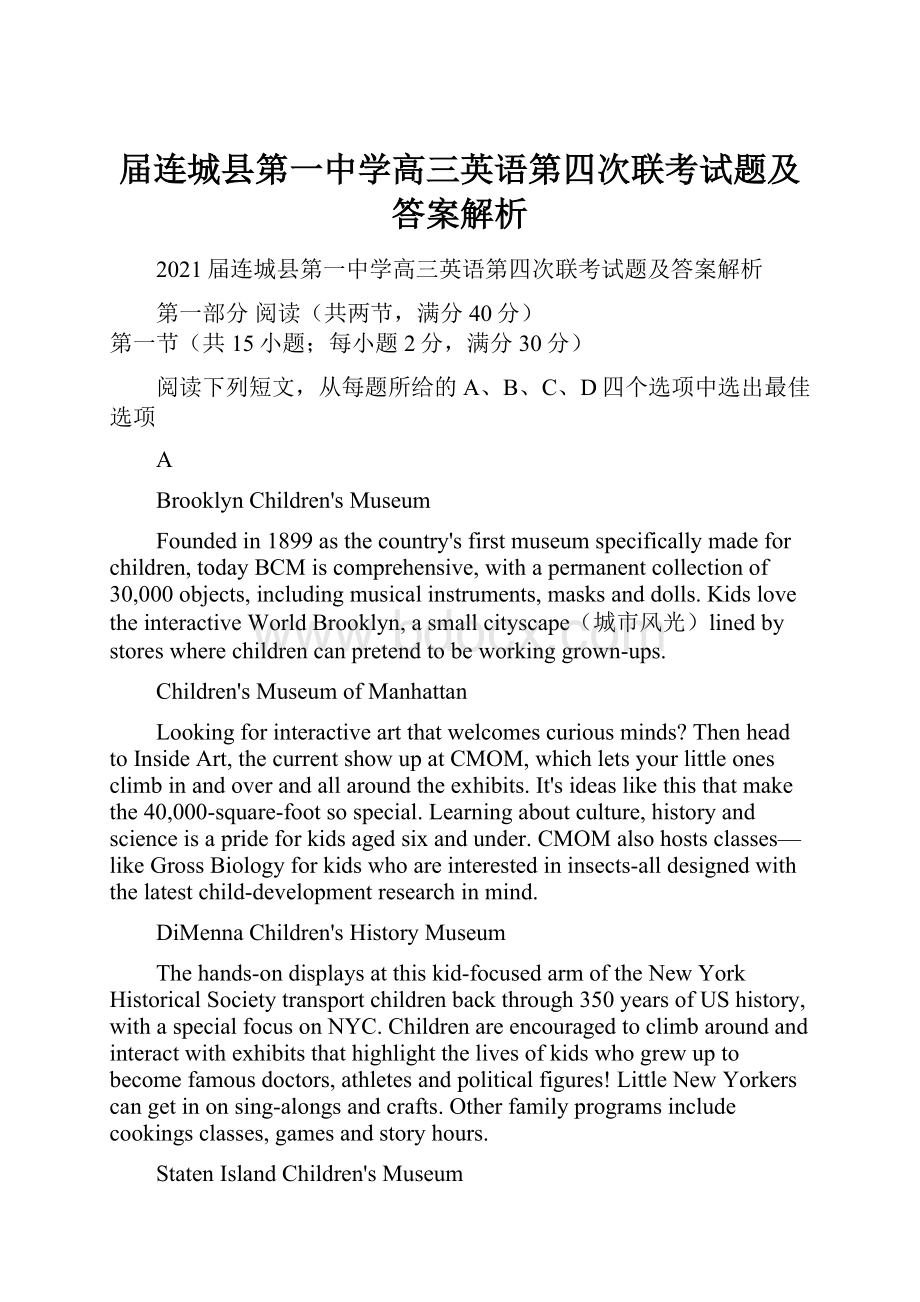届连城县第一中学高三英语第四次联考试题及答案解析.docx
《届连城县第一中学高三英语第四次联考试题及答案解析.docx》由会员分享,可在线阅读,更多相关《届连城县第一中学高三英语第四次联考试题及答案解析.docx(12页珍藏版)》请在冰豆网上搜索。

届连城县第一中学高三英语第四次联考试题及答案解析
2021届连城县第一中学高三英语第四次联考试题及答案解析
第一部分阅读(共两节,满分40分)
第一节(共15小题;每小题2分,满分30分)
阅读下列短文,从每题所给的A、B、C、D四个选项中选出最佳选项
A
BrooklynChildren'sMuseum
Foundedin1899asthecountry'sfirstmuseumspecificallymadeforchildren,todayBCMiscomprehensive,withapermanentcollectionof30,000objects,includingmusicalinstruments,masksanddolls.KidslovetheinteractiveWorldBrooklyn,asmallcityscape(城市风光)linedbystoreswherechildrencanpretendtobeworkinggrown-ups.
Children'sMuseumofManhattan
Lookingforinteractiveartthatwelcomescuriousminds?
ThenheadtoInsideArt,thecurrentshowupatCMOM,whichletsyourlittleonesclimbinandoverandallaroundtheexhibits.It'sideaslikethisthatmakethe40,000-square-footsospecial.Learningaboutculture,historyandscienceisaprideforkidsagedsixandunder.CMOMalsohostsclasses—likeGrossBiologyforkidswhoareinterestedininsects-alldesignedwiththelatestchild-developmentresearchinmind.
DiMennaChildren'sHistoryMuseum
Thehands-ondisplaysatthiskid-focusedarmoftheNewYorkHistoricalSocietytransportchildrenbackthrough350yearsofUShistory,withaspecialfocusonNYC.Childrenareencouragedtoclimbaroundandinteractwithexhibitsthathighlightthelivesofkidswhogrewuptobecomefamousdoctors,athletesandpoliticalfigures!
LittleNewYorkerscangetinonsing-alongsandcrafts.Otherfamilyprogramsincludecookingsclasses,gamesandstoryhours.
StatenIslandChildren'sMuseum
StatenIslandChildren'sMuseumnurtures(培养)creativity.Itoffershands-onexperiencesliketheBlockHarbor(plentyofblockstoplaywith!
),larger-than-lifegameslikeConnectFourandDominoes,andeventheopportunitytoclimbthroughahuman-sizedanthillorplayfirefighteratLadder11,soyou'llfindimmersive(沉浸式的)funaroundeverycorner.Don'tforgettostopbyGreenLivingRoompoweredbythewindenergywherethekidscanlearnaboutwaystoreduceourcarbonfootprint.
1.Whichmuseumprovidesbiologyclassesforkids?
A.BrooklynChildren'sMuseum.B.StatenIslandChildren'sMuseum.
C.Children'sMuseumofManhattan.D.DiMennaChildren'sHistoryMuseum.
2.WhatcankidsdoinDiMennaChildren'sHistoryMuseum?
A.Playinterestinggameswithgreatfirefighters.B.Knowaboutfamouspeople'schildhoodlives.
C.Runstoreslikeadultsindifferentsmallstreets.D.Cookdeliciouslocalfoodwithforeignathletes.
3.Wherecankidslearnhowtoprotecttheenvironment?
A.AtLadder11.B.AttheBlockHarbor.
CInGreenLivingRoom.D.Onahuman-sizedanthill.
B
AsIwaswalkinghome,aboyseemedtobesingingasonginaverylowvoice,walkinginfrontofmeandcarryingsomeofthesamehighschoolbooksIhadwithme.Icaughtuptohim,andsaid“Hello”.Icouldtellhewasstartled,anddroppedoneofhisbooks.IpickeditupandasIhandedittohim,hesaid“Thankyou.”inastrangeway,likewithastrongaccent.
Wesoonbeganwalkingtogetherandtalking.Itturnsouthewasinmyscienceclass,andIdidn’tevenknowit!
HisnamewasAhmad,andhisfamilyhadjustmovedherethisschoolyear.Heinvitedmeintohishouse,andhisfamilytreatedmelikeaspecialguest,whichmademefeelverywelcome.Hesaidhospitality(好客)isverybasictohisculture,andstrangerswerealwaystreatedverykindly.Hismombroughtoutsomegreatfood,andofferedmesometea.Ahmad’sfatherandtwosisterswantedtohearallaboutmeandmyfamily,andmyschooling.
Ahmad’swholefamilyhadtoleavetheirlifelonghomebecausewarhadbrokenout,anditwasn’tsafethereanymore.Theyleftwithonlywhattheycouldcarry.Hisfamilywashappytofeelsafe,andtheygotusedtoAmericanculturequickly.TheyseemedpleasedthatAhmadhadbroughtafriendhometomeetthem.
AndasmyfriendshipwithAhmadhascontinued,InowrealizethattheworldissomuchbiggerthanIthought!
Ialsorealizethatyourfriendsdon’thavetobejustlikeyou.Differencesmaketheworldgoround.
4.Whatdoestheunderlinedword“startled”inParagraph1mean?
A.Excited.B.Moved.
C.Surprised.D.Interested.
5.WhywasthewritertreatedlikeaspecialguestbyAhmad’sfamily?
A.Theylikedstrangerswhocametotheirhomeforhelp.
B.Theywantedtoknowmoreinformationaboutthewriter.
C.Strangerswerealwaystreatedverykindlyintheirculture.
D.ThewriterwasanAmericanandknewmuchabouttheirculture.
6.Wheredoesthewriterprobablycomefrom?
A.Canada.B.America.
C.China.D.Australia.
7.Whatcanwelearnfromthepassage?
A.Peoplefromdifferentcountriescanbegoodfriends.
B.Friendsneeddifferentculturesanddifferentaccents.
C.Yourfriendsshouldhavealotofthingsthesamewithyou.
D.Youcan’tmakefriendswithpeoplefromothercountries.
C
Threeyearsago,agroupofresearchersatCornellUniversityFoodandBrandLabhadaguess.TheyknewthatmanyapplesbeingservedtokidsaspartoftheNationalSchoolLunchProgramwereendingupinthetrash,almostuntouched.Butunlikeothers,theywonderedifthereasonwasmorecomplicatedthansimplythatthekidsdidn’twantthefruit.
Theythoughtthefactthattheappleswerebeingwhole,ratherthansliced(切片的),wasdoingthefruitnofavor.Andtheywantedtoprovethisidea.
Theycarriedoutastudyateightschoolsandfoundthatfruitconsumption(消费)jumpedbymorethan60percentwhenappleswereservedsliced.Theythenmadeafollow-upstudyatsixotherschools,whichnotonlyshowedthesameresult,butfurthersupported.Thewholeappleconsumptionatschoolsthatservedslicedapplesreducedbyabout50percentthanbefore.
Basedontheseresults,itseemsthateventhesimplestformsofinconveniencecaninfluenceus.Slicedapplesjustmakemoresenseforkids.Thehardestpartisgettingkidstostarteatingfruit,andthat’sexactlywhyslicedapplesarethewaytogo.Achildholdingawholeapplehastobreaktheskin,eataroundthecore(果核),anddealwiththeinconvenienceofholdingalargefruit.Theseproblemsmightseemsillyorunimportant,butthey’reimportantwhenyou’remissingteethorhavebraces(牙箍),assomanykidsdo.
Sometimeswhatseemslikeareallysmallinconvenienceactuallymakesahugedifference.
8.WhatcanwelearnfromParagraph1?
A.Lotsofapplesservedtokidswerewasted.
B.Researchersupportedthelunchprogram.
C.Applesarenottheonlyacceptablefruitforkids.
D.Thelunchprogramwaswellworthspreading.
9.Whatdidresearcherswanttoprove?
A.Kiddidn’twantthefruits.
B.Kidsfavoredthewholeapples.
C.Kidspreferredtotheslicedapples.
D.Kid’seatinghabitsinfluencedfruitconsumption.
10.Accordingtothestudy,wecanknow________.
A.14schoolsservedslicedfruits
B.kidshaveproblemseatingthewholeapples
C.eatingfruitsmustbehealthyforchildren
D.fewkidsaremissingteethorhavebraces
11.What’sthemainideaofthepassage?
A.Formmattersmorethantaste.
B.Applesarebeneficialtoeachkid.
C.Thewayfruitiseatenlinkskids’growth.
D.Inconvenienceprobablymakesadifference.
D
Theideaoflowmaterialdesire,lowconsumptionandrefusingtowork,marryandhavechildren,concludedasa“lyingdown”lifestyle,recentlystruckachordwithmanyyoungChinesewhoareeagertotakepausetobreatheinthisfast-pacedandhighly-competitivesociety.
Manymillennials(千禧一代)andgenerationZscomplainedtotheGlobalTimesthatburdens,includingworkstress,familydisputes(纷争)andfinancialstrains,havepushedthem“againstthewall”.Theysaidtheyhatethe“involution(内卷),”jokingthattheywouldrathergiveupsomeofwhattheyhavethangettrappedinanendlesscompetitionagainstpeers.
“Insteadofalwaysfollowingthe‘virtues’ofstruggle,endureandsacrificetobearthestresses,theypreferatemporarylyingdownascatharsis(宣泄)andadjustment,”saidascholar.“Itisnowonderthatsomeyoungpeople,underthegrowingpressuresfromchild-raisingtopayingthemortgage(按揭)today,wouldtrytoliveinasimplewayandleavetheworriesbehind.”
Interestingly,themajorityofmillennialsandGenZsreachedbytheGlobalTimes,whoclaimtobebigfansofthelyingdownphilosophy,acknowledgedthattheyonlyacceptatemporarylyingdownasashortrest.Itistruethatwiththegreatimprovementoflivingconditions,someChineseyouthhavepartiallylostthespiritofhardshipandarenotwillingtobeartoomuchhardwork.Butinfact,lyingdownisnotentirelycomfortable.Youngpeoplewholiedownalwaysfeelguiltyabouttheirconstantlossofmorale(士气)farbeyondtheirreach.
“Youngpeopleoncampushavebothaspirationsandconfusionabouttheirfuture,butmostofushaverejectedsettingourselvesupinchainstowasteopportunitiesandchallenges,”apostgraduatestudenttoldtheGlobalTimes.“It’snouserunningaway.Ihaveto‘standup’andfacetherealitysoonerorlater.”
12.Whatdoestheunderlinedphraseinparagraph1mean?
A.Warned.B.Criticized.
C.Touched.D.Amused.
13.Whatmighthavecausedthe“lyingdown”lifestyleamongtheyoung?
A.Improvementsinlivingconditions.
B.Growingpressurefromfamilyandsociallife.
C.Increasingmaterialpossessionsfromfamilies.
D.Temporaryadjustmenttofailureincompetitions.
14.What’sthescholar’sattitudetowardthe“lyingdown”group?
A.Understanding.B.Intolerant.
C.Supportive.D.Unclear.
15.Whatcanbeinferredabouttheyounggenerationfromthetext?
A.Theyneverreallydroptheirresponsibilities.
B.Theyreallyenjoythe“lyingdown”lifestyle.
C.Theyfindtheirdreamsfarbeyondtheirreach.
D.Theywouldratherescapethantakechallenges.
第二节(共5小题;每小题2分,满分10分)
阅读下面短文,从短文后的选项中选出可以填入空白处的最佳选项。
选项中有两项为多余选项
CanWeStopFoodLongingThroughImaginaryEating?